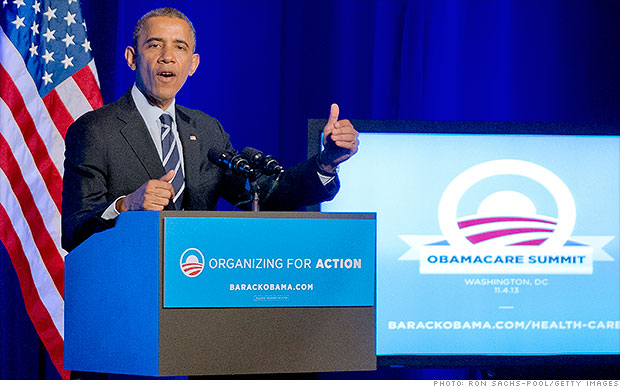 NEW YORK (CNNMoney) Insurers can keep their customers on policies that don't comply with Obamacare for another two years, the Obama administration announced Wednesday.
NEW YORK (CNNMoney) Insurers can keep their customers on policies that don't comply with Obamacare for another two years, the Obama administration announced Wednesday. The change could prevent Americans from receiving a new round of termination letters just before the November midterm elections. The cancellations last fall created a public relations nightmare for Obama officials, leading them in November to allow insurers to extend these plans into 2014.
But the move doesn't automatically mean people can keep their old plans, which typically have lower premiums because they don't provide the comprehensive coverage required by Obamacare. As before, state insurance commissioners have to permit insurers to continue offering these policies and insurers have to opt to do so.
About half of states allowed insurers to offer renewals. Administration officials cited a RAND study that estimated 500,000 kept their pre-Obamacare policies into this year.
These plans, which often carry high deductibles and offer skimpy coverage, were originally supposed to end and be replaced with Obamacare-compliant policies. Obamacare plans set an annual limit on out-of-pocket expenses and cover many more benefits, including drugs and maternity care.
Many states, however, refused to allow the extensions, fearing that it would drive healthier residents away from the Obamacare exchanges. That would increase the risk profile of the exchanges, possibly leading to a hike in premium prices for 2015.
The National Association of Insurance Commissioners said Wednesday it remains concerned that the renewal option could sow confusion and have a negative impact on rates.
"Once again, state insurance commissioners will need to consider carefully how this will impact rates, consumer options, and the overall marketplace," said Adam Hamm, the group's president, in a statement. "Even if the regulator decides to allow the plans to continue without coming into compliance, carriers may still cancel plans, as we saw in several states after the November announcement."
Several major insurers did not immediately return requests for comment. But the industry's trade group issued a statement saying that if more young and healthy people chose not to go into the exchange, it could lead to higher premiums for those in exchange plans.
The policy shift, the latest in a long string of changes and delays in Obamacare's implementation, would allow i! nsurers to offer renewals on policies that begin on or before Oct. 1, 2016. That means some customers can stay on these plans into 2017.
The renewal option also applies to small businesses. The Congressional Budget Office estimated that a total of 1.5 million individuals and small businesses retained their former plans, administration officials said.
Unlike last fall, when the administration move came as a surprise to many, White House officials said they are announcing this change early to allow commissioners, insurers and customers time to make decisions and set rates for 2015. A senior administration official said there would be no more major changes to Obamacare this year, reiterating that open enrollment for 2014 will end March 31.
Also, officials announced that the open enrollment for 2015 coverage would be extended. It will now run from Nov. 15 to Feb. 15.
And the annual limit on out-of-pocket costs for individuals in 2015 will go up to $6,600, from $6,350 this year, and $13,200 for families, from $12,700. ![]()
No comments:
Post a Comment